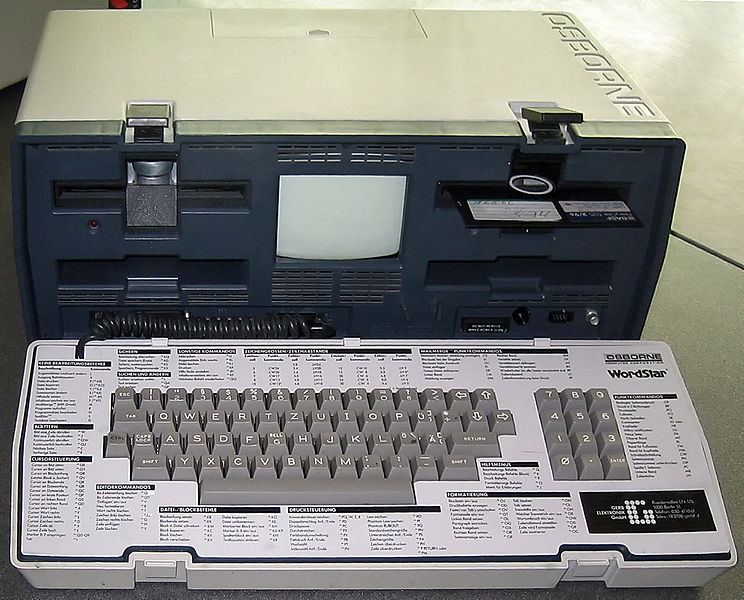Strangling the iPhone of health care

Can you imagine being afraid to give this up as your daily computer because you have never seen an iPad or iMac, and believe that a laptop weighing less than three pounds is not only impossible but dangerous to even imagine? That’s where we are with health care today. Except that instead of being stuck with a computer of the eighties, we’re stuck with health plans of the forties. (Image courtesy Johann H. Addicks, CC-BY-NC-ND 3.0)
In the latest Commentary, a Dale Edmondson writes in that its all well and good to say that employee wages would increase if employers didn’t pay for their health insurance, but wouldn’t this just mean that the employee would have to spend the same money to get the same care?
The author of the original piece, Benjamin Domenech, writes that there would be significant savings because
By funneling benefits through employers, you increase transaction costs, subsidize demand, and insulate consumers from price signals. We see this particularly in the health-care arena, where the subsidization of employer-sponsored health insurance and the problems of third-party payer form a particularly dangerous combination.
There is no question that reducing the number of middlemen from three, four, or even five1 down to one would vastly improve our health care market, reducing prices and increasing quality.
But there is a bigger issue involved that almost always accompanies government mandates of a particular form of something. We do not know how many better forms exist.
The assumption is that an individual market would replace, on an individual level, the very strange system of health “insurance” that has arisen around government mandates, subsidies, and tax incentives. But there is no reason to assume that this is true, and in fact a direct connection between people and their health needs would almost certainly bring about not just a better version of what we have now, but entirely new means of meeting health care needs customized to each individual.
Just as with the archaic computer I postulated in Walking into quicksand, our current health insurance system is designed around what we thought would be a good idea in response to government polices in the forties. We locked our current form of employer health plans into place over seventy years ago. Our health care system today looks a lot like that old back-breaking luggable I wrote about. We just don’t recognize it because we don’t have anything newer to compare it with. It’s the only form we’ve ever seen, and we’re afraid to lose it because we don’t know what else is out there.
We have no idea what the tablets and laptops and 27-inch screens of health care are, nor how much better life will be when we get government out of the way and let them exist.
In response to Why we must not ration health care: Rationing health care means fewer cures.
The employer, government, and the insurer, at least. Potentially also the insurance packager and the health care packager.
↑
- Cartels, Crony Capitalists, and the American Paycheck: Benjamin Domenech at Commentary
- “Yes, rising costs are a problem, but a major part of the reason this problem exists is the force of government-mandated benefits. By funneling benefits through employers, you increase transaction costs, subsidize demand, and insulate consumers from price signals.”
- Health care reform: walking into quicksand
- The first step, when you walk into quicksand, is to walk back out. Health providers today are in the business of dealing with human resources departments and government agencies. Their customers are bureaucrats. Their best innovations will be in the fields of paperwork and red tape. If we want their innovations to be health care innovations, their customers need to be their patients.
- The Truth About ‘Wage Stagnation’: Benjamin Domenech at Commentary
- “Might it be that what we’re really seeing with wage stagnation is an indication that, for many low and middle-income workers, the compensation that would’ve gone into their pocketbook as cold hard cash is instead going in other directions—namely, to nonwage benefits?”
More Commentary Magazine
- Why now for the alt-right?
- Why are people attracted to bullying movements today, when they weren’t yesterday? Because they see that bullying works.
More health care
- COVID Lessons: The Health Care Shutdown
- It’s fortunate that COVID-19 was not as bad as the experts said, because our response was almost entirely to make the problem worse. We shut down everything that could help, including health care for co-morbidities. We locked the healthy and the sick together, and cut people off from routine care. Most of the deaths “from” COVID-19 were probably due more to our response than to the virus itself.
- Community health acts to improve Obamacare
- Democrats now want to talk about how to improve Obamacare. Here’s how to do it.
- Why government-funded cancer research is dangerously unlike the Manhattan Project
- A “Manhattan Project” for cancer is likely to delay cancer cures, and make what cancer cures we find more expensive—like the Epipen. And kill people, like the original Manhattan Project.
- Why does the EpiPen cost so much?
- With Mylan raising the cost of the EpiPen even as the EpiPen enters the public domain, people are complaining—but they’re complaining in ways that will raise health costs even more.
- Catastrophic Care: How American Health Care Killed My Father
- David Goldhill, inspired by the unnecessary death of his father in a hospital surrounded by great doctors, nurses, and technology, describes in detail why health care today kills people—and then charges for it. In no other industry could a business fail so miserably, and then send a bill for having failed. He also argues persuasively that the ACA took all the bad parts of our health care system—and made them worse.
- 17 more pages with the topic health care, and other related pages
